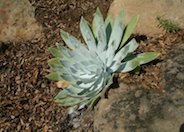
Common name:Chalk Dudleya, Chalk-Lettuce
Botanical name:Dudleya pulverulenta
Chalk Dudleya is a succulent. with 12" diameter rosette and waxy leaves; it has interesting flower spikes.
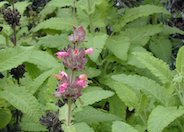
Common name:Hummingbird Sage, Pitcher Sage
Botanical name:Salvia spathacea
The extravagant leaves of this small clumping sage emit a perfectly sweet fragrance, which attracts hummingbirds. In the spring, the reddish pink flowering spikes become a deep fuchsia. It is a great plant for dry shade.
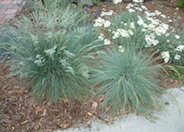
Common name:Blue Fescue, Blue Fescuegrass
Botanical name:Festuca glauca
This groundcover/grass will grow less than 1' tall and has small, blue green leaves.
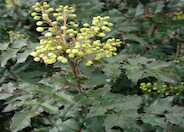
Common name:Oregon Grape
Botanical name:Mahonia aquifolium
Exhibiting erect growth, this evergreen shrub grows to a height of 6'. The leaves are 4"-10" long, with 5-9 very spiny-toothed, oval leaflets that are 1.5" in length.
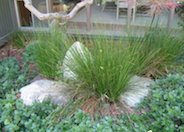
Common name:Spiny Rush
Botanical name:Juncus acutus
This native Rush grows naturally in moist alkaline soils especially in coastal salt marshes. As one of the larger native Rushes, growing to 3'-4' tall and 3'-4' wide, it can provide interest through form and structure in a natural garden setting. It is carefree-looking. The tips of the leaves are sharp so care should be taken when designing the landscape not to place this species close to walkways, etc. Tall grasses are highly combustible.
| Designer: Form LA Landscaping | Coolness in Dry Shade |
Photographer: GardenSoft |
Soils and Compost:
Incorporate compost 6" into your soil to retain water, reduce compaction, feed earthworms, and provide valuable nutrients to your plants.
Water Saving Tip:
Mulching and adding compost to soil can minimize evaporation and help soil absorb and store water.
Integrated Pest Management:
Attract, or buy beneficial insects such as ladybugs and lacewings to control pest outbreaks in your garden.

